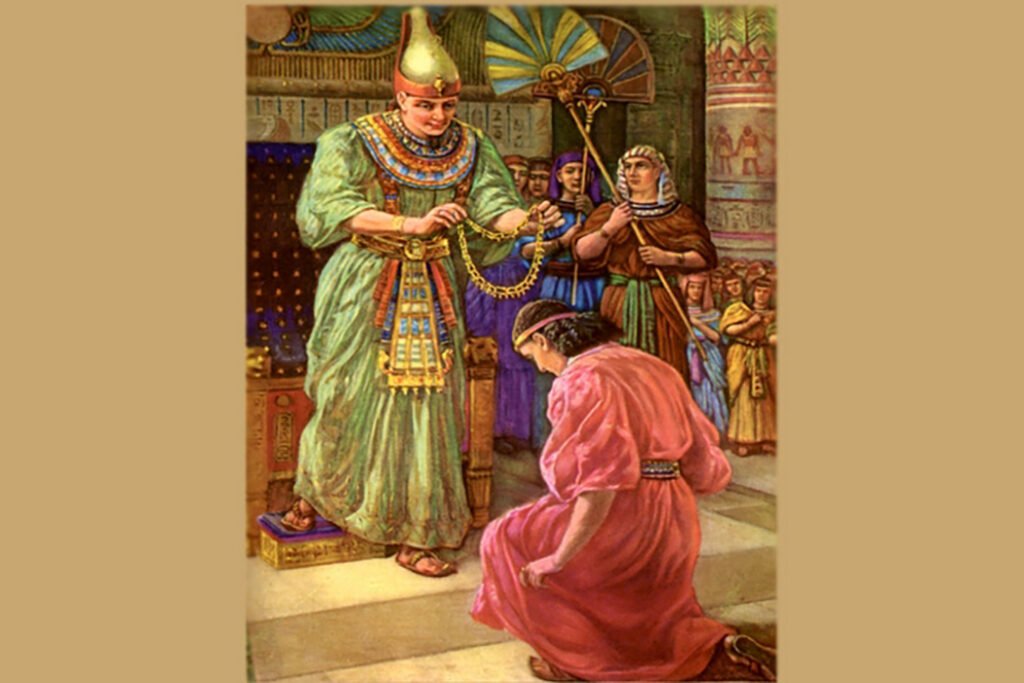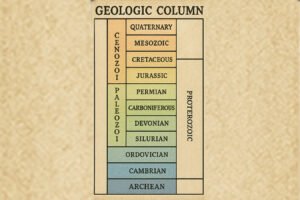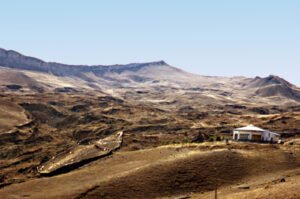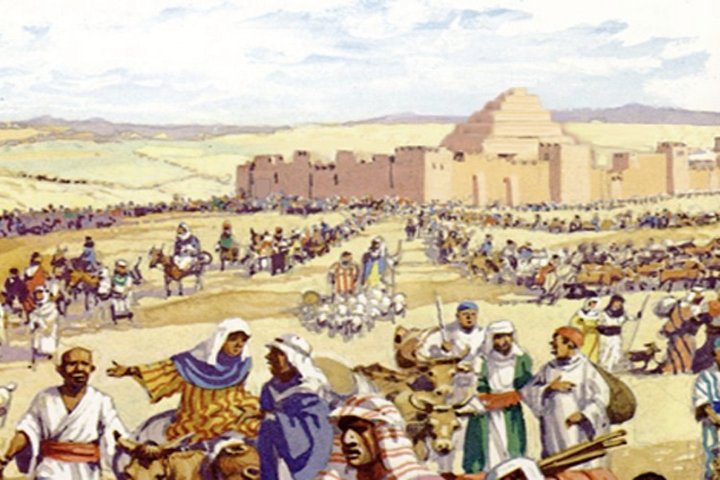Joseph in Ancient Egyptian History
It's rather amazing how historians and archaeologists have managed to explain away evidences which validate the Biblical account. Myths and legends derived from actual events of Biblical times are found all over the world, such as the multitude of flood stories. But to the unbeliever, these only prove that the Bible was influenced by these myths.
The fact is that these myths are satanic corruptions of the truth- designed by Satan to convince man that, in his own cleverness, he is smarter than God. And ultimately, this kind of thinking leads a person to deny entirely the existence of God and the truth of the Bible. Yet, no one seems to think it strange that every known civilization has had some type of religious system.
If there is no God, where did this idea of "religion and gods" come from? It came from the original truths known by the original post-flood family of Noah. And the facts are that the evidences found validate the Biblical account, not the myths and legends.
Setting the Stage- Abraham in Egypt
According to our chronology, taken from the Biblical record, the flood was in about 2348 BC. Abraham left Haran in about 1921 BC, about 427 years after the flood. Soon after this (we don't know exactly how soon) he and Sarah went to Egypt because of a famine in Canaan. The Biblical account is extremely short on the subject of Abraham's visit to Egypt (Gen. 12:10-20) but we do learn that Abraham misled the pharaoh about who Sarah was- he told him she was his sister.
This was partially true since she was his half-sister, but she was also his wife. The pharaoh, because of her beauty, took her to his palace. (Gen. 12:12-15). The king paid Abraham well for Sarah (verse 16) but God intervened, causing some types of plagues to fall upon the pharaoh. (verse 17).
When the pharaoh figured out the cause for these plagues, he called Abraham to account, asking him why he lied to him about Sarah. (verse 18, 19). He then ordered his men to escort Abraham and his entourage out of Egypt. (verse 20). Egypt at this time was already a rich nation, and it was at this time that Abraham became rich in cattle, gold and silver, given to him as payment for Sarah. (Gen. 13:1,2).
Egyptians Considered Shepherds to be an Abomination
And there is good evidence that it was at this time that the regulation prohibiting the Egyptians from eating, drinking or fraternizing with foreign shepherds was instituted. (Gen. 46:34).
Josephus relates that Abraham was responsible for bringing the knowledge of arithmetic and astronomy to the Egyptians, which may also be true. We believe the time of Abraham's visit to Egypt was early in the 1st Dynasty.
Evidence of Jacob's Family Being Given the Land of Rameses by Pharaoh
Some of these great evidences relate to the story of Joseph in ancient Egypt. And please read the account in the Bible before you view these evidences.
Inscriptions on a monument to Horemheb, a pharaoh several years after the Exodus, provide circumstantial evidence of the story of Joseph's pharaoh's invitation to Jacob's family to come to Egypt and live. It tells of a community of shepherds from the "north" (Canaan) asking Egypt to allow them to pasture their cattle "as was the custom of the father of their fathers from the beginning".
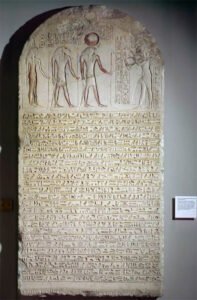
This mirrors patterns in other Egyptian records of foreign pastoralists requesting permission to use pastureland in the Nile Delta, such as Papyrus Anastasi 6 during Merneptah’s reign.
Here is the most widely accepted translation of the key passage in Papyrus Anastasi VI, which dates to the reign of Merneptah (regnal Year 8), lines 51–61. It records how a border official reported:
"We have just let the Shasu tribes of Edom pass the fortress of Mer‑ne‑Ptah (in Tjeku), to the pools of Per‑Atum [Pithom] of Mer‑ne‑Ptah (also in Tjeku), in order to keep them alive, and to keep their cattle alive, by the will of Pharaoh, L.P.H., the good Sun of every land…”
These are very important texts which shed great light on the story of Jacob's family being given "the best of the land, the land of Ramses, or Goshen". Like other ancient nations, once the pharaoh had made a declaration of law on a subject, the following kings all recognized it because each pharaoh was considered the earthly embodiment of the god. But these passages do not refers to Jacobs family- they refer to other Semites who obviously came to the land after Jacob and his family were established there.
Jacob's Family
The family of Jacob were Semites who would become the children of Israel (Jacob). They were given the land of the Delta region, the best of the land because Joseph had saved Egypt from the 7 year famine and it became extremely wealthy by selling grain to all the surrounding nations, like Canaan.
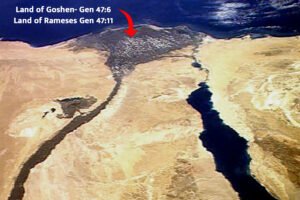
The delta region, the land they were given, was perfect for raising their flock. It was well-watered with several tributaries of the Nile. They didn't mix with the native Egyptians because Egyptians considered them of the lowest class. And as we pondered above, perhaps this law against fraternizing with shepherds was a direct result of Abraham's contact with them earlier. But that is just theory. Whatever caused their disdain for shepherds, it played a major role in providing a safe haven for the children of Israel.
Other People (the Hyksos) Not of Jacob's Family Move to the Delta Region
It is apparent that as time wore on, other Semites came into the land Jacob was given and settled there. And in time, these foreign people, later called "Hyksos", or "Shepherd kings" would cause so much trouble for the native Egyptians, that war would be raged against them, to expel them from the country. But when this occurred late in the 17th dynasty and completed very early in the 18th, the children of Israel could not be expelled because of Joseph's pharaoh's gift of the land. So, since they couldn't expel them, they were enslaved. But that comes later.
Who in Ancient Egypt was Joseph?
It would be about 200 years after Abraham when Joseph would be elevated to his high position in Egypt, second only to the pharaoh. And in the 3rd Dynasty, there appears on the scene a most incredible individual in the ancient records- a man called Imhotep. Ron firmly believed this was Joseph, as preserved by Egyptian records.
For many years, Egyptologists had doubted that Imhotep had been a real person. They found it rather difficult to believe the various accomplishments credited to him in the accounts written over a thousand years after he was supposed to have lived. At times, Imhotep has been termed the "Leonardo da Vinci" of ancient Egypt, but in fact he was more than that. Da Vinci gained the reputation of a genius- Imhotep was eventually elevated to the status of a god.
In Egypt's long list of "gods", very few were ever once living among them. Imhotep was. Manetho wrote:
"...during his [Djoser of the 3rd Dynasty] reign lived Imouthes [i.e., Imhotep], who, because of his medical skill has the reputation of Asclepius [the Greek god of medicine] among the Egyptians and who was the inventor of the art of building with hewn stone."
Imhotep WAS a Real Person
It was this statement- that he was "the inventor of building with hewn stone"- that caused the scholars to doubt the existence of a real man named Imhotep. But in 1926, the question was settled once and for all. Imhotep was a real man. When excavations were carried out at the Step Pyramid at Sakkara, fragments of a statue of pharaoh Djoser were found. The base was inscribed with the names of Djoser and of "Imhotep, Chancellor of the King of Lower Egypt, Chief under the King, Administrator of the Great Palace, Hereditary Lord, High Priest of Heliopolis, Imhotep the Builder, the Sculptor, the Maker of Stone Vases...".
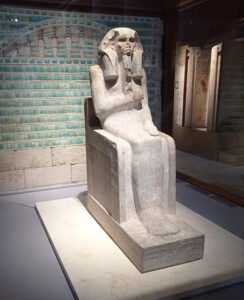
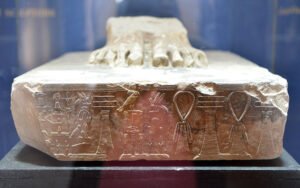
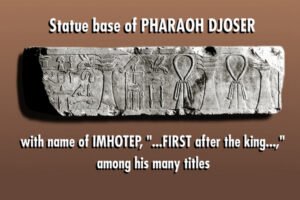
Does this fit what we know of Joseph? The Bible is quite clear on his high rank under the pharaoh:
GEN 41:40 Thou shalt be over my house, and according unto thy word shall all my people be ruled: only in the throne will I be greater than thou. 43 And he made him to ride in the second chariot which he had; and they cried before him, Bow the knee: and he made him ruler over all the land of Egypt. 44 And Pharaoh said unto Joseph, I am Pharaoh, and without thee shall no man lift up his hand or foot in all the land of Egypt.
Joseph was the first person ever given such honor by a pharaoh, which is confirmed by evidences in Egypt. If this man, Imhotep, was Joseph, surely there must be some evidence tying him with the Biblical account.
Inscription of the 7 Year Famine
Joseph's main position was that of a prime minister and Imhotep was the first who could boast of such a broad range of authority in ancient Egypt. There are records of many, many viziers throughout Egyptian history. But the first evidence which connects Imhotep with Joseph is an amazing inscription found carved on a large rock on the island of Sehel just below the First Cataract of the Nile.
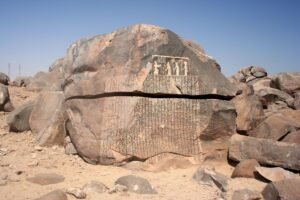
This inscription claims to be a copy of a document written by Djoser in the 18th year of his reign. This copy was written over 1,000 years after the events it claims to be relating. It goes on to tell of a seven year famine and seven years of plenty. Let's look at a few passages from this inscription and compare them with the Biblical account, keeping in mind that this was written a millennium after the events it claims to be describing and compare it with the Biblical account:
1. It begins with the great distress of the pharaoh: "I was in distress on the Great Throne..."
GEN 41:8 And it came to pass in the morning that his spirit was troubled;
2. In the inscription, the pharaoh is troubled about a famine and asks Imhotep who the god of the Nile is, so he can approach him about the drought: "... I asked him who was the Chamberlain,...Imhotep, the son of Ptah... `What is the birthplace of the Nile? Who is the god there? Who is the god?'" Imhotep answers: "I need the guidance of Him who presides over the fowling net,..."
GEN 41:16 And Joseph answered Pharaoh, saying, It is not in me: God shall give Pharaoh an answer of peace.
In the Egyptian text above, Imhotep is termed "the son of Ptah", who was the Egyptian god known as the "creator" of everything else, including the other gods.
3. In the inscription, Imhotep answers the pharaoh about the god of the Nile and tells him where he lives. In the Bible, Joseph interprets the pharaohs dream. But, the next thing in the inscription tells that when the king slept, the Nile god Khnum revealed himself to him in a dream and promised the Nile would pour forth her waters and the land would yield abundantly for 7 years, after a 7 year drought.
This passage reflects the fact of a dream by the pharaoh of 7 years of plenty and 7 years of famine, although reversed.
4. The inscription then goes on to record Djoser's promise to the Nile god, Khnum, in which the people were to be taxed 1/10 of everything, except for the priests of the "house of the god", who would be exempted.
GEN 47:26 And Joseph made it a law over the land of Egypt unto this day, that Pharaoh should have the fifth part, except the land of the priests only, which became not Pharaoh's.
Summary of the "Famine Stele"
We have an inscription which tells a story of pharaoh Djoser asking his vizier, Imhotep, to help him with the problem of a great 7 year famine. Imhotep tells him he must consult the god because the answer is not in him.
Then, the pharaoh dreams a dream which foretells the event. Next follow seven years of plenty, which is reverse from the Biblical account. The pharaoh levies a tax of 10% on all of the population except for the priesthood. The Biblical account tells of a 1/5, or 20% tax, with the priesthood exempt. All of the components of the Biblical account are present in this inscription, except that the story has been "Egyptianized" to fit their religious beliefs.
It is believed that this inscription was written during the 2nd century BC, by the priests of Khnum for the purpose of justifying their claim of some land privileges. Part of the inscription states the pharaoh dedicated some of the land and taxation to the god.
A Similar Inscription on the Isle of Philae
But this isn't the only inscription with this tale. There is a similar inscription on the Isle of Philae, only this one has the priests of Isis stating that Djoser made the same gift to their god for the same purpose. Just as the story of the flood is found in almost every ancient culture but is twisted to fit their own purposes and gods, here we find the story of Joseph, only it is twisted to fit the needs of the priests of the various gods in substantiating their claims to certain land.
The Name "IMHOTEP" and its Meaning
The name, Imhotep, in ancient Egyptian is translated to mean "the voice (or mouth) of Im’. However, there is no record of a god in Egypt called "Im". But, we all know the God, "I AM":
EXO 3:14 And God said unto Moses, I AM THAT I AM: and he said, Thus shalt thou say unto the children of Israel, I AM hath sent me unto you.
JOH 8:58 Jesus said unto them, Verily, verily, I say unto you, Before Abraham was, I am.
God told Moses to tell the pharaoh that "I AM" had sent him because "I AM" was the name by which the Egyptians had known Joseph's God. Could "Im" have been "I AM"? This may be nothing but coincidence, but it is thought provoking.
The name the Bible states that was given to Joseph by the pharaoh, "Zaphenath-paneah", has been translated by some to mean, "the God lives; the God speaks". Since we do not fully understand the meaning of the Egyptian "hotep", it is quite possible that the translation of Imhotep ("The voice of I AM) is identical to the Biblical name of Joseph ("the God lives; the God speaks).
However, it may just be coincidental.
Imhotep, the Physician
Imhotep is the earliest physician whose historical records survive and although Joseph isn't mentioned as being a physician, the Bible gives one very important clue to this:
GEN 50:2 And Joseph commanded his servants the physicians to embalm his father: and the physicians embalmed Israel.
Here, the physicians are specifically stated to be under Joseph. Later, when Imhotep became established as the "god of healing", it is the manner in which he healed that ties him directly to Joseph.
Ancient Greek writings mention a great sanctuary at Memphis where people came from everywhere to seek cures from Imhotep. They would pray to him, make offerings and then spend the night in this sanctuary, which was a sort of Lourdes of ancient Egypt.
While sleeping, the god, Imhotep, was said to come to people in their dreams and cure them. Is there a connection between Joseph and dreams?
GEN 37:8 And his brethren said to him, Shalt thou indeed reign over us? or shalt thou indeed have dominion over us? And they hated him yet the more for his dreams, and for his words.
Remember, it was Joseph's dream about he and his brothers binding sheaves when their sheaves stood up and bowed to his, that was one of the causes of their great jealousy of him.
GEN 37:20 Come now therefore, and let us slay him, and cast him into some pit, and we will say, Some evil beast hath devoured him: and we shall see what will become of his dreams.
The Wisdom of Imhotep
The Biblical account also speaks of Joseph's wisdom:
GEN 41:39 And Pharaoh said unto Joseph, Forasmuch as God hath shewed thee all this, there is none so discreet and wise as thou art:.
Again, the evidence points to Imhotep. Imhotep was revered for his wisdom. In several inscriptions from much later times, reference is made to the "words of Imhotep". For example, in "Song from the Tomb of King Intef", we read:
"I have heard the words of Imhotep and Hardedef...".
The inscriptions in the above mentioned “Songs from the Tomb of King Intef” go on to explain that Imhotep’s "sayings" were recited in his day. To date, nothing has been found of Imhotep's works, however there are several works of "wise sayings" attributed to one "Ptahotep", who is only known as a vizier of a king from the 5th dynasty.
Who was Ptahotep?
There are 5 known "Ptahoteps", all viziers to pharaohs of the 5th dynasty and all priests of Heliopolis, or "On". Evidence seems to indicate that after Imhotep, the trend among viziers became patterned after him, with these later viziers taking credit for Imhotep's actual deeds and his writings- a practice which the Egyptians, among others, were notorious for.
If we assume that Joseph wrote a collection of wise sayings, they would of course be inspired by God. Because of his great favor with the king, these came to be revered by the scribes and people. His fame as a sage spread throughout Egypt and became the standard of wisdom.
We know that his wisdom came from the true God of Abraham. Would it not be expected that Joseph would pass on his wisdom from God to those around him? In fact, the Bible says that he did:
PSA 105:17 He sent a man before them, even Joseph, who was sold for a servant:...20 The king sent and loosed him; even the ruler of the people, and let him go free. 21 He made him lord of his house, and ruler of all his substance: 22 To... teach his senators wisdom.
After Joseph's death, it is more than likely that others copied his wise sayings and took credit for them, perhaps adding a bit of their own and changing things to suit them. As these sayings were passed down through several generations, instead of being attributed to Imhotep, they were attributed to Ptahotep, "the voice of" the Egyptian creator, "Ptah".
Thousands of years later, several papyruses were found which purport to be copies of "The Instruction of Ptahotep". Could this scenario of others taking credit for his writings have happened?
There are 2 particular statements in Ptahotep's writings which indicate that this is exactly what happened. At the end of these manuscripts, the writer states that he is near death, having lived 110 years and that he received honors from the king exceeding those of the ancestors. In other words, he received the most honors ever given a man by a pharaoh. And, we know that Joseph died at the age of 110 years.
It gets even more familiar as we examine the text of these manuscripts. They begin as Solomon's Proverbs begin, as instructions to his son, with the admonition they are "profitable to him who will hear" but "woe to him who would neglect them".
Keep in mind that the Originator of Joseph's wisdom was also the Originator of Solomon's wisdom, and the parallels between the two are undeniable. We are told in the Bible that Solomon knew many, many proverbs:
1KI 4:30 And Solomon's wisdom excelled the wisdom of all the children of the east country, and all the wisdom of Egypt. 31 For he was wiser... and his fame was in all nations round about. 32 And he spake three thousand proverbs: and his songs were a thousand and five.
This statement indicates that the concept of a "proverb" was known to the ancient peoples. We aren't told if Solomon was the author of all of these proverbs or whether they were passed down to him from his ancestors.
There are examples of proverbs in many ancient civilizations, but the only ones which Solomon recorded by inspiration and today appear in the Bible are very similar to the ancient Egyptian "wisdom literature" which can be traced back to Imhotep. This doesn't mean that Solomon copied from the ancient Egyptians- it means that the God of His Fathers gave the same wisdom to his ancestors, who included Joseph, that He gave to Solomon.
Here are comparisons of a few passages of Ptahotep's writings to the Bible:
1) "Don't be proud of your knowledge"
PRO 3:7 Be not wise in thine own eyes: fear the LORD, and depart from evil.
2) "One plans the morrow but knows not what will be".
PRO 27:1 Boast not thyself of to morrow; for thou knowest not what a day may bring forth.
3) "If you probe the character of a friend, don't enquire, but approach him, deal with him alone,..."
PRO 25:9 Debate thy cause with thy neighbor himself; and discover not a secret to another".
4) "If you are a man of trust, sent by one great man to another, adhere to the nature of him who sent you, give his message as he said it."
PRO 25:13 As the cold of snow in the time of harvest, so is a faithful messenger to them that send him: for he refresheth the soul of his masters.
5) "Teach the great what is useful to him."
PRO 9:9 Give instruction to a wise man, and he will be yet wiser: teach a just man, and he will increase in learning.
We also find parallels in other Books, such as Psalms and Ecclesiastes:
6) "If every word is carried on, they will not perish in the land."
PSA 78:5 For he established a testimony in Jacob, and appointed a law in Israel, which he commanded our fathers, that they should make them known to their children: 6 That the generation to come might know them, even the children which should be born; who should arise and declare them to their children:
7) "Guard against the vice of greed: a grievous sickness without cure. There is no treatment for it.
ECC 6:2 A man to whom God hath given riches, wealth, and honour, so that he wanteth nothing for his soul of all that he desireth, yet God giveth him not power to eat thereof, but a stranger eateth it: this is vanity, and it is an evil disease.
8) "If you are a man of worth who sits in his master's council, concentrate on excellence, your silence is better than chatter... gain respect through knowledge..."
ECC 9:17 The words of wise men are heard in quiet more than the cry of him that ruleth among fools.
9) "The wise is known by his wisdom, the great by his good actions; his heart matches his tongue..."
PRO 18:21 Death and life are in the power of the tongue: and they that love it shall eat the fruit thereof.
10) "If you are one among guests at the table of one greater than you, take what he gives as it is set before you."
PRO 23:1 When thou sittest to eat with a ruler, consider diligently what is before thee:
God Provided Knowledge of Himself through Joseph
God used Joseph to establish in Egypt a safe haven for the growth and development of the "seed of Abraham" until they were ready to be delivered into the land God had promised them. And while in Egypt, surrounded by paganism, God would not leave His people nor the Egyptians without access to His Truth.
Imhotep Appointed Later in Djoser's Reign
There are several other items concerning Imhotep which continue to fit the Biblical account. We know that the pharaoh of Joseph had been king for an unknown period of time when Joseph was finally brought to him to interpret his dream. And the evidence shows that Imhotep was not Djoser's vizier earlier in his reign. In fact, no mention is made at all of Imhotep on Djoser's earlier monuments.
Imhotep was not the architect of Djoser's tomb built at Beit Khallaf, which was probably undertaken soon after he became king. In this earlier tomb, which is similar to the preceding dynasties as Sakkara, there are clay sealings of jars which record Djoser's name, his mother's name, and the names of numerous other officials from his reign, but not Imhotep's, which indicates that he hadn't been appointed to his position yet. The standard practice was for the pharaoh always to appoint men to office as soon as he took the throne, with family members being the highest ranked.
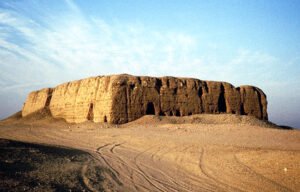
All available information about Imhotep continues to point to his identification with Joseph. For example, in some inscriptions, his titles indicate that he was not a member of the royal family, but a "self-made man". This was unique because in later years, the son of the pharaoh was usually the vizier.
Imhotep was also the "priest of Heliopolis", the Biblical "On". In the story of Joseph, we learn that his father-in-law was the "priest of On" at the time of Joseph's marriage:
GEN 41:45 And Pharaoh called Joseph's name Zaphnathpaaneah; and he gave him to wife Asenath the daughter of Potipherah priest of On. And Joseph went out over all the land of Egypt.
Since Asenath was old enough to marry Joseph at this time, it follows that her father was probably at least in his forties. And in ancient Egypt, the people didn't live too much longer than about 50. At his death or disability, it follows that his son-in-law would be assigned his position, especially if that son-in-law were so highly regarded by the pharaoh as Joseph was.
If Joseph became the "Priest of On", was he being unfaithful to the true God? Absolutely not. The pharaoh had recognized the power of the God of Joseph, and even though the Egyptians remained idolaters, Joseph made them aware of his God and was unswerving in his loyalty to Him. The "Priest of On" was not termed the priest of a particular god- but the title indicates a position of high honor and political importance in the city of Heliopolis, or “On”.

Welcome to the Ron Wyatt Archives. I'm Mary Nell (Ron's wife) and this site will attempt to fully document Ron Wyatt's work and discoveries. This website will be an ongoing project to document his work on all his various discoveries. Please check back often as new things will be added constantly.
| READ MORE |

